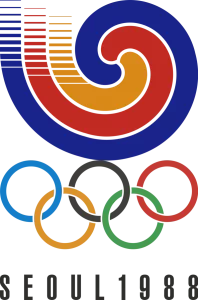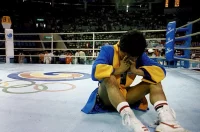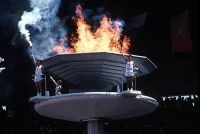
The Olympic Games represent the height of sporting diplomacy, with thousands of athletes transcending politics for two weeks as they represent their countries on the world stage. While the athletic spectacles entrance and amaze on television, without the behind-the-scenes political efforts and negotiations, there would be no Olympic Games. For many countries, hosting the Olympics is an opportunity to show the world its culture, hospitality, and innovation. The 1988 Summer Games served as just such an opportunity for South Korea, as they gave the world a preview of South Korea’s impending economic boom, as the country moved alongside Japan to become a leader in technological development.
Moreover, the 1980 and 1984 summer Olympic Games, held in Moscow and Los Angeles respectively, were marred by the Soviet invasion of Afghanistan and the subsequent boycotts.By 1988, there were no such issues and Seoul had one of the highest participation rates to date, with 159 countries and 8400 athletes attending. It also marked the swan song for Olympics powers the USSR and East Germany. as both ceased to exist before the next Olympic Games.
Edward Kloth, who was serving as Korea Desk Officer at the State Department, was reassigned and became the Olympic coordinator for the U.S. Thomas Dunlop, who was working as the Country Director for Korea from 1987-1989, observed firsthand the impact of the Olympics on Korean society and their perceptions of Americans in Korea during the Games.
Aloysius O’Neill was serving as a Political Officer in South Korea from 1988-1992, and during his time in Seoul he had the enormous task of managing the competing egos of the American delegation to the 1988 Summer Games and dealing with angry Koreans outraged at the antics of one U.S. Olympic gold meal winner. All three were interviewed by Charles Stuart Kennedy; Kloth’s interviews began in November 2008, Dunlop’s in July 1996, and O’Neill’s in August 2008.
Read more about North Korea’s bombing of a South Korean airliner. Go here to learn about how U.S. used Mohammed Ali and others to convince countries to boycott the Moscow Olympics.
“The 1988 Olympics were seen by all Koreans as a big national coming-out ceremony”
Edward Kloth, Korea Desk Officer, Department of State, 1986-1988

KLOTH: That mid-‘80s was a transition period; not only were the politics of Korea changing but also its economic situation. Korea was moving into the “developed” category. In 1969, Korea exported cloth and wigs. By 1986, it was electronics and cars, including cars to the U.S.
Korea hosted the 1988 Olympics. It was their coming-out party on the world stage. The Olympics was also a pressure point for Chun as well. If he did anything that marred the Olympics, that would have been a political disaster. The 1988 Olympics were seen by all Koreans as a big national coming-out ceremony, as 1964 had been for Tokyo and all of Japan. This was going to be Korea presenting itself to the outside world in a very spectacular fashion.
One of my additional duties, which was pretty much all-consuming for the next month, was as the embassy’s Olympic coordinator. My predecessor, John Miller, had been for at least the previous two years the Olympic coordinator dealing with the ROK [Republic of Korea] government entities and the Seoul Olympic organizing committee, and the U.S. government, all the various entities that were concerned about VIP visits, security and all the rest of it.
Regrettably, the embassy did not designate an understudy for John who could take over that job when he left. The idea was that when I came in four weeks before the opening ceremonies, I would become the Olympic coordinator, which was not a great idea. It consumed a huge amount of my time….
So that was all going on at the time that I was immersing myself in all sorts of horrendous protocol details having to do with preparing for an impending presidential delegation to the Seoul Olympics.
Thomas Dunlop, Country Director for Korea, Department of State, 1987-1989
DUNLOP: 1988 was the year that South Korea was to host the Olympics, the “Seoul Olympics.” The South Koreans had done an awful lot to prepare for the Olympic Games. It was really remarkable what they did, when they learned that they were to host the games. They built a whole, new sports complex and a Metro system to service the site. They put in highways where highways had never been. They did a great many things. They were looking forward to this very much as signifying the entry of South Korea onto the world stage. And this is what it was. It was, in fact, well carried out. They accomplished that.
Naturally, in North Korea this event was viewed as help to their deadly enemies in South Korea. We were very much concerned that the North Koreans would undertake, not just one or two attacks, but perhaps a whole campaign of terror to try to disrupt the Olympic Games. In preparation for the Seoul Olympics, we and the South Koreans worked very closely together.
I must say that the Japanese also helped a great deal. Whatever else happened in that Korean-Japanese relationship, which is still very uneasy and troubled, the Japanese were completely cooperative in connection with the Seoul Olympics. They provided a lot of security help. Almost all of the travelers from the West going to South Korea, traveled via Japan. So the Japanese set up some very elaborate and, apparently, very effective security arrangements.
The Seoul Olympics took place in August, 1988. In November 1987, a scheduled Korean Air airliner, flying East from the Persian Gulf and bound for Bangkok and Seoul, disappeared over the Andaman Sea, just South of Burma. I think that something like 280 people were on board, or something like that. All of them were killed. (After the KAL 007 shoot down, the name of the airline was changed from “Korean Air Lines (KAL) to “Korean Air” (KA).
The Seoul Olympics were a great success for the South Koreans. There were lots of anecdotes about them, none of which particularly deserves recording. The South Koreans did a good job. I was not there for it. I thought that I might try to boondoggle my way out there, but the Embassy was under a tremendous amount of stress just handling the American Olympian contingent.
I would say one thing. I got to know some of the people who represent our Olympic movement, and some of them are absolutely arrogant, egocentric, and very difficult people to deal with. I mean that they are concerned about petty things, like demanding suites with a hot tub and things like that. I’m not talking about the athletes. I’m talking about the administrators in the American Olympic Committee and all of their hangers-on. They can be real pains to deal with. The Embassy didn’t need me hanging around, so I did not go.
NBC had the coverage. The South Koreans didn’t like the coverage. We had complaints from them. NBC, like any American network, put on a lot of background stuff about Korea. Of course, what they did was to oversimplify things. Although there are a lot of things in Korean history that are not particularly admirable, on the human rights side, for example, this was probably more than the South Korean authorities wanted to see dredged up from the past and, maybe, the not so distant past. However, there were no big problems.

I remember one example of cultural insensitivity. There was a Korean boxer who was thought likely to take one of the medals and, perhaps, win the gold medal. He was in one of the middleweight areas.
He was really beaten and committed a foul in the process, which counts a lot in the Olympics. You get points, and the foul involves subtracting points from the total. He lost. He refused to leave the ring. After the celebration of his opponent’s victory, he slumped down in the middle of the ring.
However, the cameramen didn’t turn off the lights. The cameras were still on him. He presented a picture of utter dejection. People came up and tapped him on the shoulder, but he just sat there. The commentators began to laugh at him. He stayed there in the center of the ring for about an hour. They would keep cutting back to show him. They would say, “Oh, he’s still there.”
I thought that this was just perfectly without any shred of taste. What was happening to that young man was that his whole life was in ruins. He had lived to be an Olympic boxer. He was a hero in his hometown. He had a salary. He had preferment. He had goodies which were otherwise probably unthinkable for his family. He had the responsibility for keeping all of that going. It was all gone. He knew that they would set the dogs on him in his home village. He would be pelted with stones when he got back there. I think that it was a particularly bad case of insensitivity.
Dealing with U.S. Prima Donnas
Aloysius O’Neill, Political Officer, Embassy Seoul, 1988-1992
ONEILL: The Olympics was on the macro level a huge triumph for South Korea. It did exactly what it was supposed to do. The Koreans worked in their usual industrious fashion and built the right kinds of stadiums and other venues, organized themselves, and put on a spectacular show.
There was a U.S. presidential delegation, but that sounds much more unified than this group was. The head of the delegation was the estimable and fabled Vernon Walters who at the time was U.S. Ambassador to the United Nations. Walters was separately being invited by the Koreans anyway because of his long association with Korea and was coming on his own USAF [U.S. Air Force] airplane for the opening ceremonies. He and his group were totally professional and easy to deal with.
The real problem was the rest of the presidential delegation which was coming mostly on one VC-135 VIP airplane from Andrews [Air Force base in Maryland], but there were others coming separately as well: one was the Counselor of the State Department, Edward Derwinski, a former Republican Congressman from Chicago. His wife was coming separately from him.
The group was a varied collection of people, including some who had Olympic connections. One was a Korean-American who had won a gold medal in Los Angeles in 1948 as a diver….Dr. Sammy Lee. He had been, among other things, Greg Louganis’s diving coach. Louganis was going to be a big star in Seoul. There was a woman who won a swimming gold medal in the ’64 Tokyo Olympics. Others were political figures who didn’t want or didn’t get political jobs in the Republican administration at the time, including one who was the CEO of a big headhunting firm.

These people all were coming in one flight but soon wanted to scatter to the winds. Each one of them thought they were important enough to have their own schedules. Trying to keep track of all of these characters was really a major problem. Ambassador Jim Lilley had to get involved in corralling them at one point and listening to all their complaints about the way the embassy wasn’t catering to their every single whim every second of the day. He had a breakfast for the group of them at the Residence.
At the breakfast, Ed Derwinski, Counselor of the Department, was accusing the Ambassador and the embassy of being against the Seoul Olympics from the start. As best Ambassador Lilley and I could figure out, he meant that the embassy had been accurately reporting the repression of the Chun Doo- Hwan government over the years before it was replaced by the more democratic government of Roh Tae-Woo. Derwinski, who was of a conservative persuasion, was incensed at this, in effect angry that the Embassy had been doing its job on the political front….
Ambassador Lilley…knew I was doing my job, and he was supporting me 100%, which was a great relief. He told me, and I won’t name the swimmer who got the gold medal in Tokyo ’64, but there was a dinner at the Blue Palace, the presidential mansion, hosted by President Roh for people related to the Olympics.
She was incensed to find out that she was not invited. She complained to Ambassador Lilley, and he said to me more or less these words: “What am I supposed to tell her? The Soviet minister of sports was not invited either.” This gives you an idea of the towering egos that were packed on that one airplane. Anyway, it was a difficult juggling match because we were trying to cater to them to the extent that we possibly could….
The Olympic Games, aside from being a great triumph for Korea both in terms of organization and of the face that Korea put to the world was, as far as I was concerned, also a festival of anti-Americanism. That’s my most lasting memory of the Seoul Olympics.
The Koreans were so on edge and so intent to ensure that everything went perfectly that anything involving Americans that didn’t go perfectly really set them off. This included the opening ceremony. The American team was waving to the crowds and cheering, and some of them were wearing Mickey Mouse ears and things like this as young, happy, naive Americans traveling abroad probably for the first time would normally do. This greatly offended the Korean news media who decided that this was not decorous enough and respectful enough of Korea for their sensibilities, and they began blasting the American team for that breach of decorum.
“It’s safe to say that Koreans understood the concept of doing outrageous things while drunk”
One of the first American gold medals was won by a men’s swimming relay team, and those young guys went that evening to the Hyatt Hotel and had a number of drinks, I’m sure, in the bar. They walked out of the bar with a plaster lion’s head that had been hanging on the wall. They just picked it up. It wasn’t something, as far as I know, that you could stick in your pocket, so it was pretty obvious that they were doing it.
Rather than just approaching these tipsy or drunken young men who had just won a gold medal and said, “Give us our lion head back,” the Korean staff of the Hyatt went to the police about this “theft.” The police lost no time in going to their eager media contacts about this gigantic crime.
From the media outcry, you would have thought that these swimmers had burned down the presidential mansion, the Blue House. The outrage was unbelievable. I was, as I often was, in the embassy that Saturday afternoon. The incident was on a Friday night, and I was in the embassy all day Saturday, and the phones were almost literally ringing off the hook with outraged Koreans calling. The poor embassy operators were just beside themselves trying to field the calls.

I remember talking to one man who was just furious. “How could they do this??? How could they possibly steal something?” I said, “They were to say that Koreans understood the concept of doing outrageous things while drunk.
This whole thing, this hysteria, was fanned by the Korean news media.
NBC Sports had the broadcast rights for the Olympics. They did a masterful job of broadcasting. Also as part of their programming they had prepared a number of really good — what would you call them? — spots or vignettes showcasing different things about Korea’s industrial might and the economic progress of the country, the palaces of Seoul, the history of Korea, things on the Korean War. Some of my relatives wrote me how much they learned about Korea from this fantastic coverage that NBC Sports was giving the country.
However, there was at least one spot about black marketing and prostitution particularly around the U.S. military bases, a not unknown phenomenon, shall we say….
There were security concerns. Nobody knew what the North Koreans were going to do.
The North Koreans had tried mightily to get the International Olympic Committee (IOC) to split events between before awarding the Olympics to Seoul. Thereafter, the North Koreans were trying to get the IOC to award certain events to Pyongyang which the IOC was just not going to do.
Remember that the North Koreans in November of 1987, while I was still in Rangoon, blew up a South Korean airliner, KAL 858, south of Rangoon in the Andaman Sea. Almost certainly this was on orders of Kim Jong-Il, apparently with the idea that this was going to be one of a series of attacks aimed at discouraging countries from going to the Olympics and otherwise putting a blight on South Korea’s success.

A small bomb exploded in the Taegu Airport at one point which forensic investigation indicated was a type used by North Koreans. So there was a very strong concern about security not so much about Islamic radicals although this was not too many years after the 1972 Palestinian outrage in Munich. So we had a lot of security related people there in Seoul working with the Koreans on a very broad basis.
The Olympics aside from being an enormously successful sporting event, was indeed a showcase for Korea. The Koreans did a masterly job of building the venues that they needed, bringing athletes and visitors in, organizing everything, making sure that every event went smoothly, and that the opening and closing ceremonies were spectacular. The whole thing was fantastic and a great triumph for the Korean people.
But it was also tremendous on a political level. The North Koreans were just left in the dust. They were just about the only country that didn’t send a team. I think maybe Cuba boycotted, but nobody else that I know of did. The Mongolians were there, the Soviets were there in a big way, the Chinese, the Vietnamese, everybody else that you could think of, was all there.
This really became the coming-out ceremony that the Koreans wanted and deserved. They worked hard on a lot of levels including the political.
